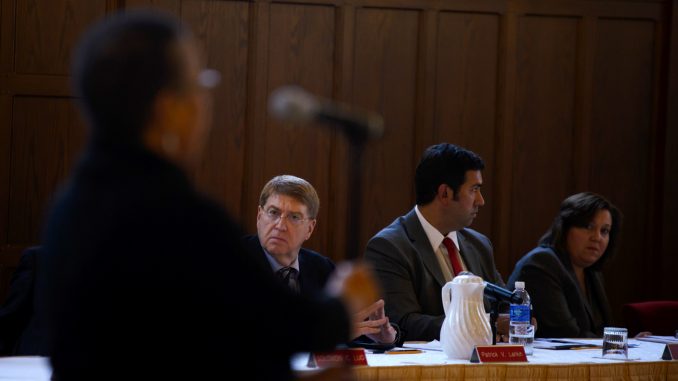
Recent talks about an on-campus football stadium indicated progress toward construction by 2017, some secured commitments from donors and new proposed retail space around the potential stadium’s site on the west edge of Main Campus.
In a meeting yesterday in Sullivan Hall, the Board of Trustees unanimously agreed to make contact with architects and conduct an environmental impact study for the proposed site—bounded by Broad Street to the east, Norris Street to the north, 16th Street on the west and Montgomery Avenue on the south.
That impact study, and the correspondence with architects about design, was ordered to cost no more than $1 million, Chairman Patrick O’Connor said in the meeting. The university projects that the total budget for the stadium will not exceed $130 million, and $50 million of that will come from fundraising.
President Theobald said Temple has already secured “about $12 million” in fundraising from donors, with $15 million more “in the pipeline.”
“At this point, we just know: stadium, and retail, with construction in 2017,” Theobald said. “The goal is to use that stadium every day.”
In a presentation to attendees at the public meeting, Theobald suggested that retail space would surround the 35,000-seat stadium on the east and south sides of the complex—Broad Street and Montgomery Avenue. The university will choose an architect within 30 days, he said.
Theobald compared the proposed retail section to the shopping strips around the Boston Red Sox’ Fenway Park.
The Board approved the resolution to find an architect and conduct the study following a tense session of public comment from 10 people, which lasted about 50 minutes. Developer and alumnus John Longacre spoke in support of the stadium, while the remaining nine, all North Philadelphia residents, were critical of plans.
O’Connor attempted to end the meeting after comment from five people, but after community members piped up, allowed John Bowie, a Yorktown resident, to come to the microphone.
“You’re talking about making a huge investment, how about rather than displace North Philly, make some investments that make a difference in this community?” Bowie said. “We’re not able to fight you, but you need to know you’re creating a resentment in the hearts of another generation of African-American people.”
Another resident interjected: “We can fight.”
Bowie was followed by several more residents who approached a microphone before the board after Theobald’s assistant, Anne Nadol, read off their names. Some of the residents in the public comment portion had been let in from a protest outside the building organized by a group called “Stadium Stompers.”
Guadalupe Portillo, who lives on Norris Street near 15th and works as a custodian for Temple, said her neighbors had criticized the university for not being “mindful” of the community members who oppose the stadium.
“You have not bothered to have any meetings with them or talk to them about this,” Portillo said while wearing her work uniform. “We are in a gridlock situation there as it is, you know there is a gridlock with parking, with the trash around here.”
“As residents … we have no one to help us when we’re crying out for help,” said Tyrone Reed, the president of the Committee for a Better North Philadelphia and a lifelong neighborhood resident. “I said to them, ‘You know where you live, do you have to go through fighting a major institution for survival of your community?’”
The meeting affected Drew Katz, whose late father Lewis was a supporter of a stadium during his time as chair of the Athletics committee.
“I think there’s an absolutely healthy, legitimate debate that needs to take place on whether or not a stadium makes sense and is appropriate,” Katz said after the meeting. “My father was very much in favor of the stadium, I am here because of his passing. I do believe at this point in time that a stadium would be good for students and alumni.”
Katz also emphasized the importance of better communication with community members moving forward.
“What I learned here today as a new board member is that the university needs to do a better job at making sure the community is informed, is given an opportunity to voice its concerns, to have those concerns addressed in a productive manner,” he said.
Following the meeting, a reporter asked Chairman Patrick O’Connor to respond to community concerns.
“We’re going to ensure that labor building the stadium is representative [of the community,]” O’Connor said. “We are not insensitive to where we live and who we are. I hope we use the fields to mentor and train community kids.”
“I would not authorize this as a board member for just five freakin’ football games a year.”
Joe Brandt and EJ Smith can be reached at news@temple-news.com or on Twitter @TheTempleNews.
Listen online to “Beyond the Lede” with WHIP—Temple’s student radio—and The Temple News’ reporters for more information on this story and more.






Be the first to comment